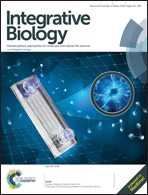A monoclonal antibody acts as a migratory cue via Ca2+ re-wiring†
Abstract
As monoclonal antibodies have two epitopes for their target ligand, they should theoretically dimerize target receptors upon binding. In particular, the dimerization of the vascular endothelial growth factor (VEGF) receptor 2 (VEGFR2) stimulates early events occurring within minutes (e.g. Ca2+ signal generation) and late events occurring over hours and days (e.g. cell migration in angiogenesis). Although studies have noted that antibodies targeting VEGFR2 (anti-VEGFR2) inhibited cell migration in angiogenesis, we show in this paper that an anti-VEGFR2 stimulus nevertheless triggered a Ca2+ signal in VEGFR2 expressing cells. This Ca2+ signal was then re-wired to promote cell migration by co-expressing an engineered Ca2+ activated RhoA (called CaRQ), thereby engineering the opposite anticipated effect of an anti-VEGFR2 antibody. In these cells, the anti-VEGFR2 antibody stimulus induced cellular blebbing, migration across a membrane, and in vitro scratch wound healing. This work expands the utility of monoclonal antibodies to induce tailored responses in engineered cells such as changes in cell fluorescence via Ca2+ reporters or migration patterns via CaRQ.



 Please wait while we load your content...
Please wait while we load your content...